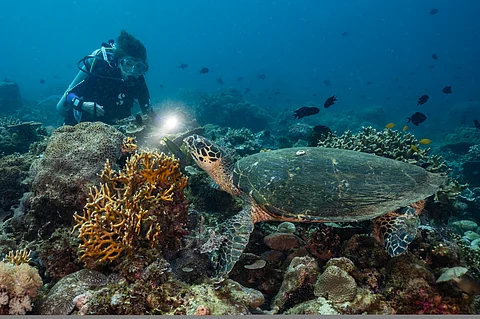
- NEWS
- the EDIT
- COMMENTARY
- BUSINESS
- LIFE
- SHOW
- ACTION
- GLOBAL GOALS
- SNAPS
- DYARYO TIRADA
- MORE

One cannot care for the ocean if one does not know it.
This sums up the life-long advocacy of world-renowned oceanographer Sylvia Alice Earle, who recently dived into the Verde Island Passage (VIP) off Mabini, Batangas to push for the conservation and protection of Philippine marine biodiversity.
Diving at 89 should be tough but it was the American marine biologist, explorer, author and lecturer’s way of rallying global support for the cause especially at a time when VIP faces threats to its health and sustainability.
Earle described the VIP as a unique global treasure with profound historical significance and exceptional biodiversity. She also stressed the honor and respect befitting the area.
“Whether it’s industry, education, science, government, whatever the powers that are represented, we need to come together to take care of nature, take care of the ocean, as if our lives depend on it, because they do,” the National Geographic Explorer in Residence and Mission Blue founder told a 24 June dialogue with conservationists and local officials as part of the country’s observance of Philippine Environment Month (PEM).
Diving with Earle in the VIP on 26 June were Mission Blue Global Ocean Policy advisor Maximiliano Bello, the Department of Environment and Natural Resources (DENR) dive team, other Filipino divers and marine scientists, University of the Philippines’ Marine Science Institute executive director Dr. Laura David and De La Salle University professor Dr. Al Licuanan.
Mission Blue is a global coalition dedicated to ocean conservation and aims to catalyze action and foster partnerships for marine protected areas such as the VIP. In July 2023, the movement named the VIP as a “Hope Spot” in recognition of its critical role in the health of the oceans.
During the dialogue, the first woman to lead the National Oceanographic and Atmospheric Administration of the United States discussed the importance of integrating biodiversity conservation with climate action, and the indispensable role of the ocean in achieving global climate goals.
DENR Secretary Maria Antonia Yulo-Loyzaga, who invited Earle to the country for the PEM forum, cited the challenges besetting the VIP and the current initiatives for the area, including research studies for its protection and management, and the establishment of marine scientific research stations in collaboration with stakeholders.
“With the VIP Protected Seascape Bill on file in the Senate and active collaboration with all stakeholders embracing a whole-of-society approach, we must move steadfastly in pursuit of a true identity of the VIP and our own country as a resilient and blue nation,” Loyzaga said.
Participating in the dialogue were United States Ambassador to the Philippines MaryKay Carlson, environmental champion Senator Loren Legarda, representatives from the University of the Philippines Marine Science Institute and De Lasalle University, ABS-CBN Foundation, Conservation International Philippines, Communities Organized for Resource Allocation, Aboitiz Equity Ventures (AEV), Metro Pacific Investments Corporation (MPIC), San Miguel Corporation (SMC), First Gen Corporation and the Ten Knots Group.
AEV, MPIC and SMC signed in May a memorandum of understanding with the DENR and the Department of Energy for the joint stewardship of the critical waterway between Luzon and Mindoro islands.
The VIP is home of over 60 percent of known shore fish species, 338 coral species (eight of which are considered rare), several endangered and threatened, and thousands of other marine organisms, it is imperative to place the VIP under stringent protection and conservation measures to enhance and preserve its true value for future generations.
The VIP is also renowned for its mangrove forests and seagrass beds, which are part of blue carbon ecosystems, contributing about 10 percent of the Philippines’ national carbon stock.
Beyond its rich biodiversity, the VIP supports fishing communities, economic activities, including passenger and goods transport, as well as critical industrial applications such as energy and telecommunications.
Under the Marcos administration, the DENR is actively seeking to expand research and monitoring to conserve and protect Philippine marine biodiversity. It received congressional funding for six new marine scientific stations in the different biogeographic areas of the country.
